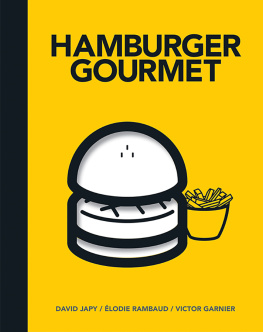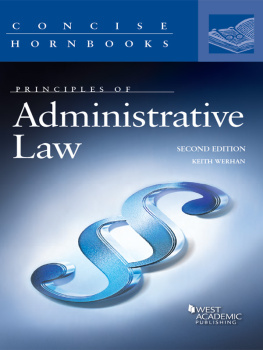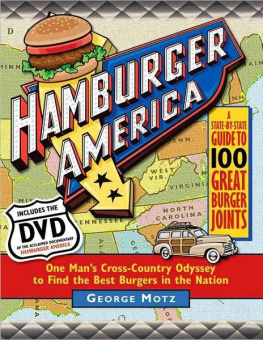Although the United States remains a republic, administrative power creates within it a very different sort of government. The result is a state within the state an administrative state within the Constitutions United States. The state within is sometimes called the regulatory state to emphasize its burdens on economic and personal freedom, and is sometimes called the deep state because of its tendency to interfere with our elected government. This book focuses on the legal side of the problem on the power claimed by the administrative state and how it slices through basic civil liberties.
Not Just Economics
Over the past century, most complaints about administrative power have come from an economic perspective. It is said that administrative power is inefficient, dangerously centralized, burdensome on business, destructive of jobs, and stifling for innovation and growth. All of this is painfully true, but these are largely economic complaints, and economic complaints are not the entire critique of administrative power.
Although this power began as an exceptional method of regulation, and was applied mostly to corporations, it has become the dominant reality of American governance, which intrudes into the full range of American life, including not only economic endeavors but also political participation and personal decisions.
The economic critique does not address the breadth of this danger. Indeed, it tends to protest merely the degree of administrative regulation, and it thereby usually accepts the legitimacy of administrative power as long as it is not too heavy-handed on business. No wonder the economic criticism has not stopped the growth of administrative power.
The Centrality of the Legal Challenge
For a better understanding of the administrative threat, one must turn to law. The legal critique more fully addresses the problem than does the economic protest, for although much administrative power is economically inefficient, all of it is unconstitutional. And this legal objection is central, because it confronts administrative power on its own terms on its pretension to bind Americans in the manner of law.
In saying that administrative power is unconstitutional, this is not to deny that executive power is extensive. Executive power is often portrayed as merely the power to execute the laws, but more accurately (as recognized by Alexander Hamilton) it amounts to the power to execute all of the nations lawful force. It thus includes the power to prosecute offenders in court, to exercise discretion in distributing benefits, to determine the status of immigrants, and so forth.
In contrast, administrative power involves not force but legal obligation, and this is why the legal challenge matters so much. Contemporary theorists sometimes suggest that law is a sovereigns command backed by coercion. But traditionally in America, notably when the Constitution was adopted, law was something that came with legal obligation the obligation to obey. Working from underlying ideas about consent, eighteenth-century Americans assumed that a rule could have the obligation of law only if it came from the constitutionally established legislature elected by the people, and that a judicial decision could have such obligation only if it came from a constitutionally appointed judge exercising independent judgment. On the basis of such principles, the US Constitution placed lawmaking power in Congress and judicial power in the courts. The power to bind that is, to create legal obligation was thus in these departments, not the executive.
Nonetheless, through administrative power, the executive purports to create legal obligation. It binds Americans and deprives them of their liberty, not through acts of Congress and acts of the courts but through other mechanisms. And this evasion of the Constitutions pathways for law is what makes the legal objection to administrative power so central.
Adding to the problem, administrative power also evades many of the Constitutions procedures, including both its legislative and judicial processes. Administrative power thereby sidesteps most of the Constitutions procedural freedoms.
Administrative power is thus all about the evasion of governance through law, including an evasion of constitutional processes and procedural rights. These legal problems are forceful reasons to reject all administrative power and, indeed, to consider it the civil liberties issue of our time.
Absolute Power, Then and Now
An initial step toward understanding the danger and unconstitutionality of administrative power is to examine some examples, past and present. Although our republic may seem too American and contemporary to bear comparison with Englands old absolute monarchy, the similarities are therefore all the more disturbing.
English absolutism was epitomized by King James I, who ruled from 1603 to 1625. Rather than being content with the governments regular power to make statutes in Parliament and to have cases adjudicated in the courts, he tried to exercise versions of legislative and judicial powers in his prerogative commissions or tribunals his equivalent of administrative agencies. And his capacity in these bodies to bind his subjects was a significant part of what was called his absolute power.
His prerogative tribunals most famously included the Star Chamber and the High Commission. The one had statutory authorization for some of its jurisdiction, and the other was entirely founded on statute. With or without legislative authorization, these bodies exercised absolute power.
Such tribunals are often assumed to have been blood-soaked torture chambers, but they were more bureaucratic than bloody. They were efficient prerogative agencies, and they exercised absolute power in ways that have come back to life in America.
L AWMAKING. Instead of legislating through acts of Parliament, King James personally issued proclamations in the Star Chamber that served as binding regulations on trade, manufacturing, and urban development. He even had these proclamations published in a volume that looked like a statute book an early equivalent of the Federal Register.
James undoubtedly had the power to issue proclamations, but proclamations that bound in the manner of law were another matter. In 1610, after James used proclamations to create regulatory offenses, Chief Justice Edward Coke and the other chief judges declared such proclamations unlawful and void, saying that the king by his proclamation cannot create any offense which was not an offense before. The judges recognized that lawmaking outside of the legislature was unlawful.
Ever tempted to exert more power with less effort, rulers are rarely content to govern merely through the law, and in their restless desire to escape its pathways, many of them try to work through other mechanisms. These other modes of binding subjects are absolute power.












